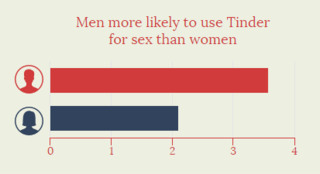Mating
Why People Use Tinder
New research can identify what kind of Tinder user you are.
Posted February 13, 2018 Reviewed by Abigail Fagan

By Elisabeth Timmermans, Ph.D.
Tinder is a popular online dating app, but it's received plenty of criticism for being a "hookup app." If we are to believe College Humor’s Modern Fairy Tale, Tinderella gave up on true love a long time ago and is busy swiping in the hopes of a one night stand.
In 2015, a feud exploded between Vanity Fair and Tinder, after journalist Nancy Jo Sales published an article in which she declared Tinder to be contributing to the dating apocalypse. This is an international phenomenon as well. A documentary on Tinder use in the UK even includes an interview with a man who claimed to have slept with over 100 women since he started swiping.
It is not the first time we have accused technology of changing our sexual behaviors. Nearly a century ago, it was the car and the entertainment industries that helped young adults change courtship practices and the concept of dating. Whereas the automobile provided young adults the opportunity to get away from their parents’ supervision, the entertainment industry gave them cheap forms of romance. Men were supposed to ask women out on a date and treat them in exchange for a sexual favor, such as a kiss. Back then, older adults and researchers also perceived this intimate behavior as a threat to their sexual norms and values.
This made me wonder: Are we in a similar situation now? Are these new technological developments offering us more sexual freedom?
The Big Tinder Project
To find out, I started the Big Tinder Project in 2015. More than 3,000 Tinder users have participated in this project. In collaboration with Elien de Caluwé, I developed the Tinder Motives Scale (TMS) based on four independent mixed-method studies in the United States and Belgium.
13 Tinder Motives
We found 13 motives to use Tinder. The most commonly cited reason is using Tinder as an entertainment tool when wanting to pass time. Imagine that you're waiting for the train or bus which is late – again. You already checked your Facebook, Twitter, and Instagram. Seems like there is nothing left for you to do but swipe your boredom away and talk to your matches.
Many people also admitted to using Tinder out of curiosity. They wondered what all the fuss was about. Some of them dare to stick around, but some do not have any clue.
Then there's also a group of people who perceive Tinder as the ideal tool to befriend strangers.
The fourth motive is – against all expectations – is the quest for love. It seems that a decent amount of people admit that they use the application for dating purposes and to find a romantic partner.
Importantly, Tinder also serves as an ego-booster. Those who want to know more about their value on the dating market just swipe to see whether they are hot or not. Beware, because these people do not necessarily feel the need to actually meet someone. Worried why your hot match is not responding? He's probably just boosting his ego!

For many students, Tinder serves as the ideal distraction during exam periods. One respondent said: “I would rather talk to a stranger to distract myself than to distract my friends as well.” Employees also admitted using the app during breaks. Ever wondered what that one colleague is doing on his or her phone all the time? Chances are high he or she is just swiping.
Several respondents also mentioned Tinder comes in handy when wanting to improve flirting and social skills. They feel like the application provides a safer environment for initiating first contact, as these interactions usually happen online. The large pool of potential matches gives them the opportunity to play around with crazy opening lines.
For those who just came out of the closet, Tinder is the ideal tool to meet people with a similar sexual orientation. Whereas LGBTQ users also use apps like Grindr, they refer to Tinder as a way to find a serious relationship.
Of course, there are also people who actually never wanted to use the application, but they were unfortunate enough to have a friend who created a Tinder profile for them. Remember that friend that is always complaining about his or her ex? Bet you already pressured that person into using an app like Tinder!
For the travelers among us, Tinder is the perfect way to communicate with locals, to meet them or simply ask them questions about the best places to go (who still wants to pay for a guide these days?) Yes, you got that right: Tinder is the new Tripadvisor!

For number 11 out of 13, a small number of people admit to using the application to increase their sexual experience. Interestingly, there was a significant difference between men and women. Either men are using the application more to increase their sexual experience or they are more likely to admit that this is what they are using Tinder for.
A minority of Tinder users admit to being mainly active on the application to forget about their ex. Finally, the last and least occurring motive to use Tinder is because it feels like everyone is using Tinder these days.
Are People Having More Sex Because of Tinder?
This brings us back to our initial question: Are people having more sex because of Tinder? Certainly not. At least that’s what the data imply.
Yet, it is important to note that these four studies are only the first step in unraveling the association between Tinder use and hook up behavior. Reported motives are not always congruent with actual behavior. It could be that using Tinder leads to having more sexual experiences, despite sexual experience not being the main motive to use the app. It is also possible that Tinder users do not dare to admit they are using Tinder for sexual purposes out of fear of being judged by others.
More research is needed to formulate a clear answer to this question. Are you eager to read more? Click here to take the International Tinder quiz to discover which Tinder user you are.
Elisabeth Timmermans, Ph.D. is a postdoctoral researcher at Erasmus University Rotterdam. She writes about social media, relationships, sex, and love on her blog, Love in Times of Tinder.
References
Timmermans, E., & De Caluwé, E. (2017). Development and validation of the Tinder Motives Scale (TMS). Computers in Human Behavior, 70, 341-350.




